Koi Betta Fish are among the greatest worshipped companions in the fish bowl relaxation owing to their appeal and attraction.
Furthermore, around a heap of Betta disparities exist, so you’re destined to invent approximately what demands you.
The koi betta is the unity of the further topical assortments that are extensive to the fish bowl relaxation by tempest. Its landscapes will indubitably add awareness to slightly aquarium.
Are these fish, though, identical to typical bettas? How are they taken care of? And what kind of betta fish should you purchase? This post will discuss koi bettas and all the details you need to know to raise one correctly.
Table of Contents
What Are Koi Bettas?
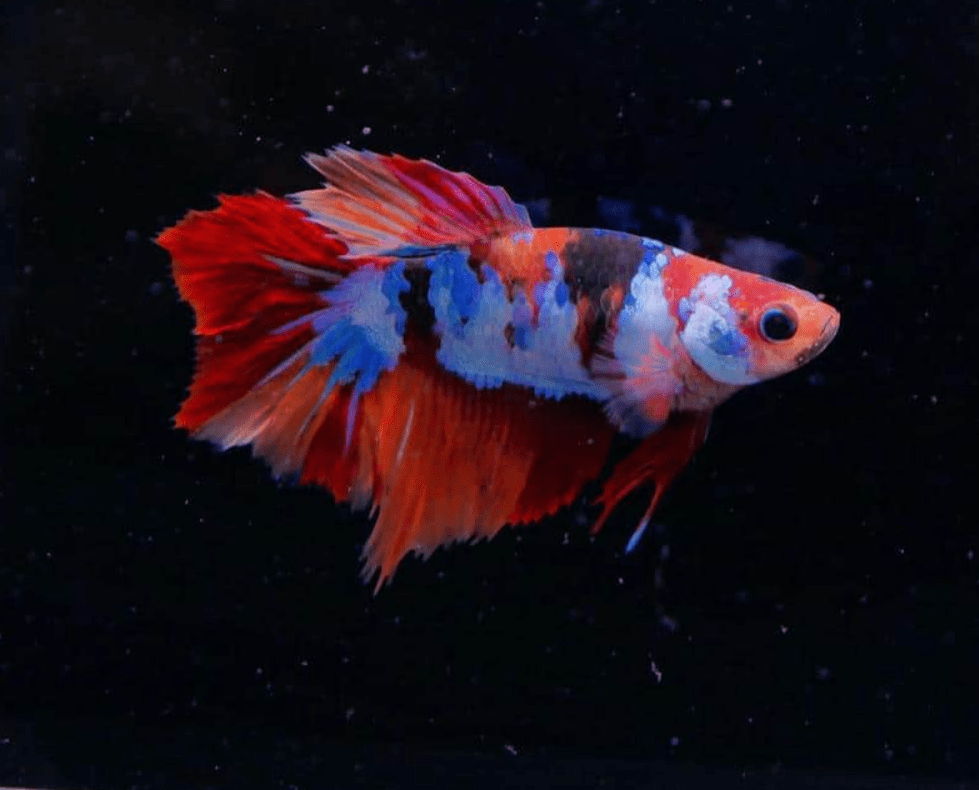
The Koi betta fish is quite an innovative addition to the aquarium sideline. This fish is opening to fasten the kindness of numerous aquarists due to its exclusive advent.
However, what precisely are koi bettas?
A variation of Betta created by selective breeding is the koi betta. Koi bettas, as the name suggests, were developed to mimic koi carp, which are well-liked ornamental fish in Japan.
Bettas that were born with this particular hue are frequently bred with other Betta varieties that have color patterns that are similar to those of koi carp to attain the desired look.
This Betta variation is a freshwater fish belonging to the Gourami family, just like conventional Bettas. The reason they are termed labyrinth fishes is that, in contrast to other common fish that get their oxygen via their gills, they breathe straight from the surface by inhaling air through their “labyrinth organ.”
Native to Southeast Asian countries like Thailand and Vietnam, bettas are found in rice fields and still marshes. Because of their tropical ancestry, they prefer warmer waters and thrive in environments with lots of vegetation.
Koi Betta Care Overview
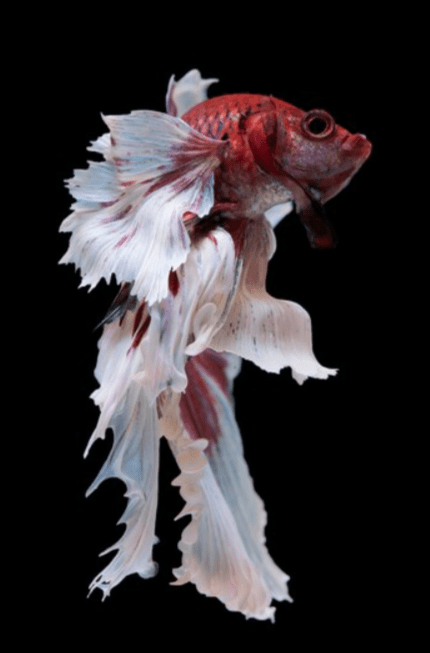
As we’ll cover in this section, you should be as informed as possible on the care requirements for these adorable little fish before you begin to raise them.
Koi Betta Fish Appearance and Size
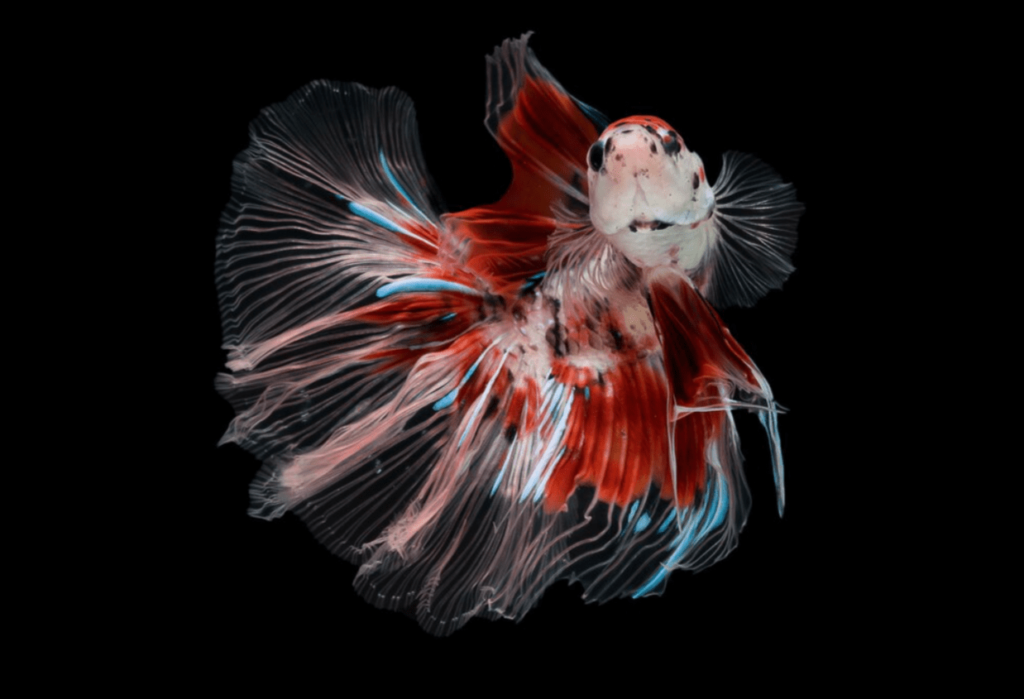
Like koi, betta fish is a particular type that has been carefully developed to display a variety of vibrant colors. Over time, koi fish have been bred to have unique patterns and coloring, frequently mixing three or more colors. This breed is hence also known as marble betta.
Koi bettas are little fish with bodies that are typically 2.5 inches long. Their elongated fins can grow up to three inches in length. In addition to being smaller than males, females tend to be rounder and plumper.
Koi Betta Fish Sexing
The distinction between male and female koi bettas is more noticeable after they reach adulthood. When they are younger, these distinctions are less obvious.
The following are some distinct indicators that a koi betta fish is male or female.
- Fin Length. Generally speaking, male fins are longer than female fins. All of this, however, is dependent upon the type of fins your Koi betta has, such as half-moon, crown tail, or spadetail. Once you know your koi betta’s fin type, you can distinguish between the two with accuracy.
- Ventral fins on the ventral side. The ventral fins of males are inherently longer and bigger than those of females.
- even when the remainder of the fins resemble those of the females in length. For example, while Koi Plakats are bipedal fish, meaning they have short caudal, anal, and dorsal fins, the male nonetheless has longer ventral fins than the female.
- Egg Spot. Mature female koi bettas frequently have a white, lump-like area next to their ventral fins. Only females have what is known as an egg spot, or gravid spot. However, juveniles might not have it yet.
- Body shape. Males have a bigger frame and a rounder cranium, while females are more streamlined.
- Coloration. Compared to female koi bettas, males typically have more vibrant colors. This is because they rely on coloration to draw in potential mates, so they must have the most striking hues available.
Koi Betta Fish Temperament
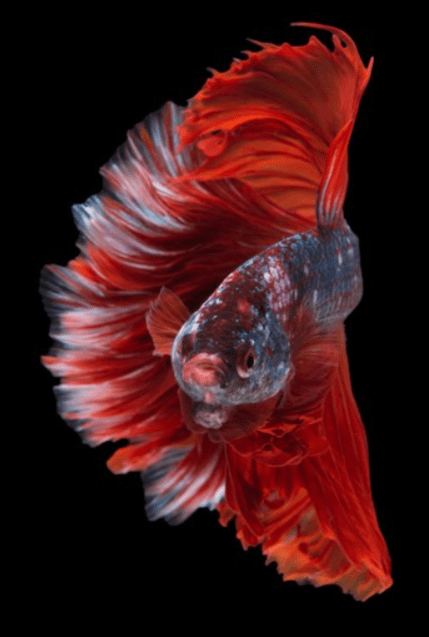
Since male Koi bettas can be highly aggressive, it is best to keep them alone, just like other male Bettas.
When given larger snails and bamboo shrimp to eat, they frequently thrive on them.
Sometimes mild-mannered males can be kept with other fish. The perfect tank buddy should be calm, have short fins, and swim quickly. To prevent territorial issues, they should not look too similar to koi betta.
Male Koi bettas should not be kept alongside females unless they are reproducing, as they can injure or even kill the females.
If the other fish in the tank aren’t too big or hostile, female bettas can be kept in a communal aquarium. Another option is to form an all-female betta club, or Betta sorority, which can accommodate up to six people.
Koi Betta Lifespan
Koi Bettas have a lifespan of two to three years, which is comparable to that of other Betta varieties.
Additionally, betta fish have been known to live for 7.5 to 10 years. Your Betta’s odds of surviving the past five years increase if she has decent genes and lives in a clean, healthy environment.
Tank Size
Comparable to distinctive bettas, koi assortments succeed in tanks that are at least 5 gallons in magnitude, but sooner 10 gallons.
Though it’s officially probable to preserve bettas in aquariums as miniature as three gallons, it’s typically not optional. The element that these nano fishbowls are disposed to Spartan variations in water quality makes upkeep much additional hard.
Besides, whereas bettas can supposedly live in slight places, they won’t be clever to advance to the filled scope.
Water Parameters
One of the furthermost significant attentions once pleasing overhaul of betta fish is aquatic worth. Though bettas are resistant fish, they are added and disposed to sicknesses and trauma if the water is cloudy and doesn’t consume the suitable limits to subsist.
Fortunately, like their regular betta colleagues, bettas commonly don’t eat any superior wants near aquatic constraints.
It would help if you had the following relevant water quality measurements in a betta tank.
- Temperature: 22–26°C (71.6-78.8°F)
- pH: 0 to 8.0
- Flow rate: Calm
- Water type: Freshwater
- Live plants: Compatible
Koi Betta Diet
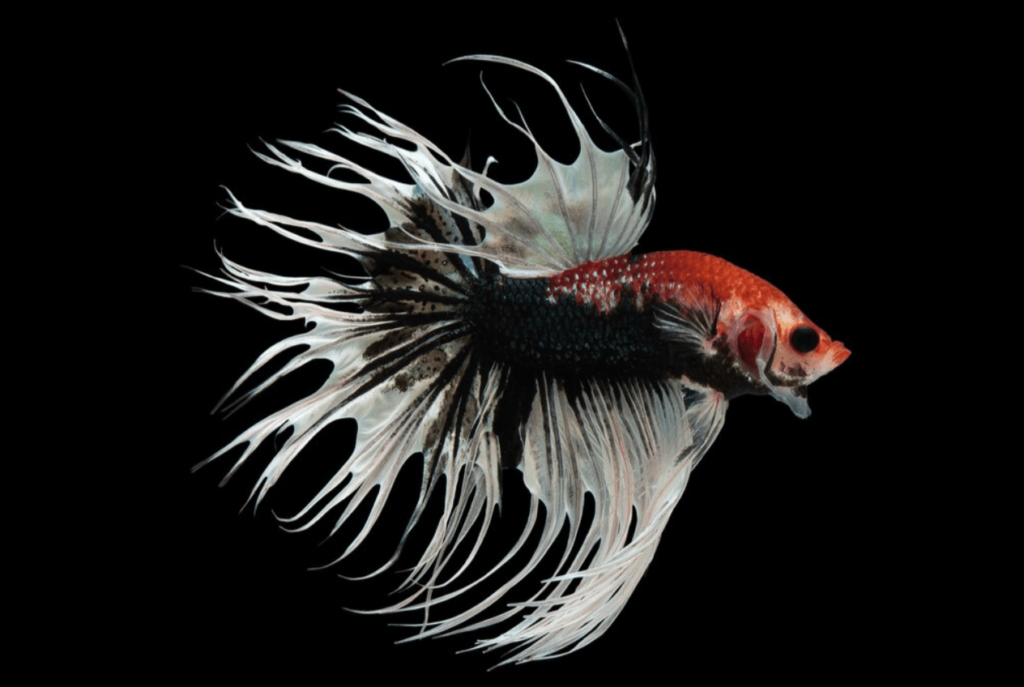
Although bettas usually eat anything that fits in their tiny mouths, they are essentially voracious hunters who do best on foods high in protein.
Feeding them premium pellets or flakes as their main meal will satisfy their carnivorous need. Additionally, you can feed your betta fish live meals like brine shrimp, daphnia, and bloodworms, or you can thaw frozen items.
Giving your betta koi commercial food as their primary source of nutrition is essential to maintaining their health. You can be certain that they are receiving all the nutrients they require in this method. Unlike other typical aquarium fish like goldfish, they won’t get healthier from fruits and vegetables.
While treats are OK in moderation, betta diets should be the main source of nutrition for them.
Koi Betta Breeding
Any hobbyist can successfully breed betta fish in a 10-gallon tank. Because they are still extremely fertile, those under a year old are ideal for breeding.
The breeding partner must be trained before they can breed. A pH of roughly 7.0 and a minimum temperature of 27°C should also be present in the water. The betta male will build a bubble nest to store the eggs in.
During the breeding season, the male may get hostile, so make sure you set up a safe hiding area for the female.
This is what usually occurs:
1. The male will surround the female while showcasing his brilliant hues. Males undergo this color shift throughout the breeding season to attract possible mates. Their colors become deeper and brighter.
2. After that, the male will fertilize the eggs that the female has released into the water.
3. After picking up the eggs, the male will spit them into the bubble nest.
4. Men are supposed to handle this kind of work. After the eggs are safely within, you can move the female to another tank.
5. The eggs will hatch in three days or so. After hatching, the Betta fry will consume the yolk sack.
Koi Betta Female
Female carp have bright colors that replicate the beauty of fish color. The beautiful fur and beautiful colors of these beautiful female betta fish will add charm to your aquarium. Although the quality and durability are not as good as the men’s, this makes it a good choice for those looking for a good pair of divers.
Koi Betta Male
Male carp are known for their beautiful carp-like colors and will add a nice touch of color to your aquarium. This beautiful pattern and beautiful fur give the Shine Betta a unique and beautiful look. Male mountain carp add style and beauty to the aquatic environment and are highly prized by aquarium enthusiasts.